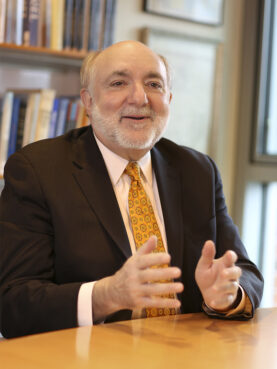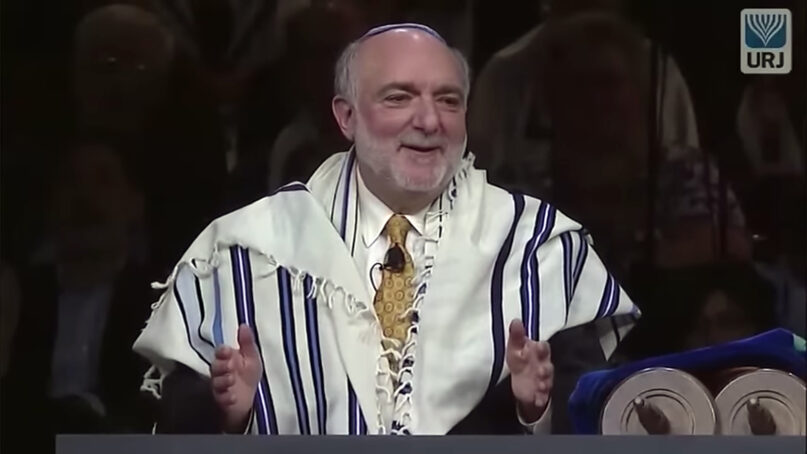(RNS) — There is a tradition not to offer eulogies for the dead during Hanukkah. The festival of lights should consist of eight days and nights of undiminished light; indeed, a light that increases with each passing night, as a miniature battle that we wage against the encroaching darkness of the solstice, and the expanding darkness of the outside world.
There is an exception, as Rabbi Michael Marmur reminded us on Sunday, and that is when a talmid chacham, a wise teacher and student, departs from this life. That death not only permits a eulogy; it requires it.
It has already been several days since the death of Rabbi David Ellenson, Ph.D, past president of Hebrew Union College-Jewish Institute of Religion; chancellor emeritus of that institution; professor of Jewish thought; and world-class Jewish public intellectual. He was 76. The cause of his death: heart disease.
What an irony. David’s heart was his gift. The throngs who crowded New York City’s Congregation Rodeph Sholom on Sunday for his funeral would attest to that.
Yes, David Ellenson’s mind was large, and wide, and expansive, and knew no boundaries — but the same was true of his heart. It was large, wide, expansive and without boundaries.

Rabbi David Ellenson in 2016. (Photo by Ajh0307/Wikipedia/Creative Commons)
He was a scholar, with depth, precision and clarity. One of the most profound things I learned from David was also the simplest: When assessing the history of the secularization of Judaism and Jews, David put it this way: “Secularism meant that Jews knew more about the wider world than about Judaism itself.”
Simple, stark and true.
But David was a mensch, as well — with a delicacy and humility that we will not see again anytime soon. He was a regular guy. As I said to a friend, who was also mourning his death: “David was always the smartest person in the room, and he never let you remember that.” You could meet him and never know he possessed one of the greatest Jewish minds of this generation. Simple, unpretentious, unfailingly friendly, a man who had the uncanny ability to make everyone feel that he was a member of their family — which he was.
Let me tell you why this death gutted me, and so many people.
This past summer, David and I were together at the Shalom Hartman Institute in Jerusalem, where he frequently taught, and where I habitually study. In the courtyard, David and I took a playful selfie together.
When I returned home, and was sharing photos of my Israel trip with my grandchildren, my 5-year-old grandson looked at the photo of David and me and said, “That’s Shai’s grandpa.”
I first met David more than 50 years ago, at Eisner Camp in Great Barrington, Massachusetts, one of the flagship camps of the Reform movement. I was working as a songleader; he — a rabbinical student at Hebrew Union College-Jewish Institute of Religion, where he would go on to teach and lead as president twice — was on faculty.
Fast-forward: His only stint as a congregational rabbi was as the assistant rabbi at The Community Synagogue in Port Washington, New York — which, decades later, I would come to serve as rabbi. He would often return to that synagogue to speak and teach and reunite with his old friends.
And, yes: Over the years there would be conferences and classes and workshops, and cups of coffee and dinners. This is not unusual; hundreds of people have parallel memories of David.
The last time we were in touch was only weeks ago. I had asked him to endorse my new book; he did so, graciously.
But, back to my grandson’s comment about the photo: My kids are friends with David’s daughter and her wife. My grandchildren are friends with their kids.
So, there you have it: three generations of friendship in one family.
Now, I know this can happen in any number of small towns in America.
That’s the point: Reform Judaism might be a large movement, but in reality, we are a small town. Three generations of friendship — it is just too sweet. I loved it, and so did David, and so did his widow, Rabbi Jacqueline Koch Ellenson.
Add to that sweetness: There are five Ellenson children. One is a rabbi; two others are in the process of becoming rabbis.
That’s called legacy.
There is one last thing I will say about David Ellenson, and it must be said — especially now.
As I read the tributes to him that have been pouring in, I have noticed something.
They come from every corner of the Jewish world — Reform, Conservative, Reconstructionist, Renewal and every flavor of Orthodoxy.
Of course, this makes perfect sense. David was himself a product of the Orthodox community in Newport News, Virginia. Unlike many other “refugees” from Orthodoxy, David did not view himself as a refugee. He never thumbed his nose at the tradition. He was never triumphalist about the claims of liberal Judaism. He loved the best of Orthodoxy (his own scholarly work was on the contributions of 1800s German Orthodoxy), and he shaped that tradition and put it to work for the modern Jewish mind.
But there is far more than that.
The across-the-Jewish-landscape tributes to David Ellenson bear witness to a redemptive and powerful truth — a truth I have been feeling profoundly these past two months.
Here it is: Since Oct. 7, the old boundaries and barriers between Jewish groups have mattered less and less. Or, to put it this way: The walls have melted; the bridges are now overcrowded.
It is not only that Hamas could not have cared less what kind of Jew you were — dati (observant), lo dati (not observant), chiloni (secular), left wing, right wing (as no Jew hater has ever distinguished between types of Jews).
It is also that we Jews have come to understand the primacy of peoplehood — of community over creed — and that many of us are more open-minded and open-hearted toward those Jews with whom we might have thought we had little in common.
That was Rabbi David Ellenson’s legacy.
May his memory be a blessing.






